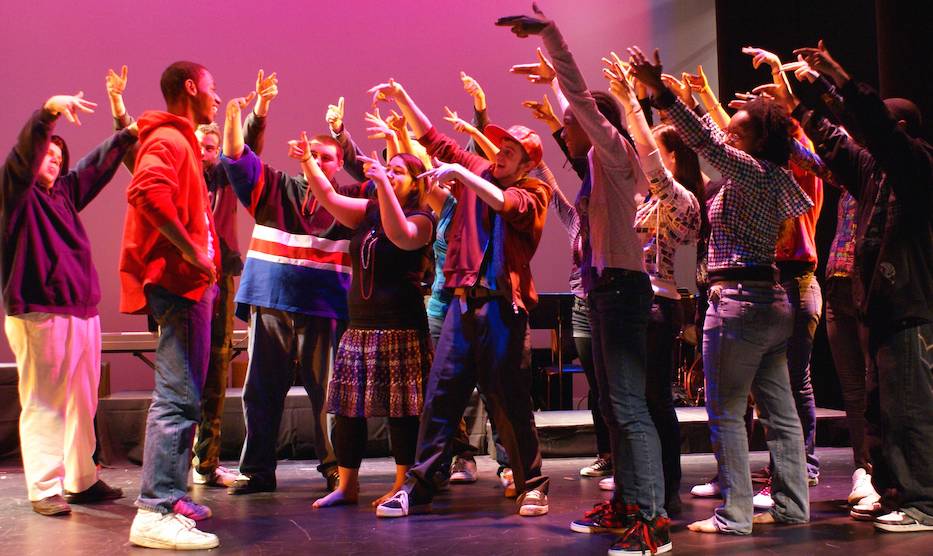
Co-Op High School | Culture & Community | Downtown | Arts & Culture | Musical Theater | Arts & Anti-racism | Shubert Theatre
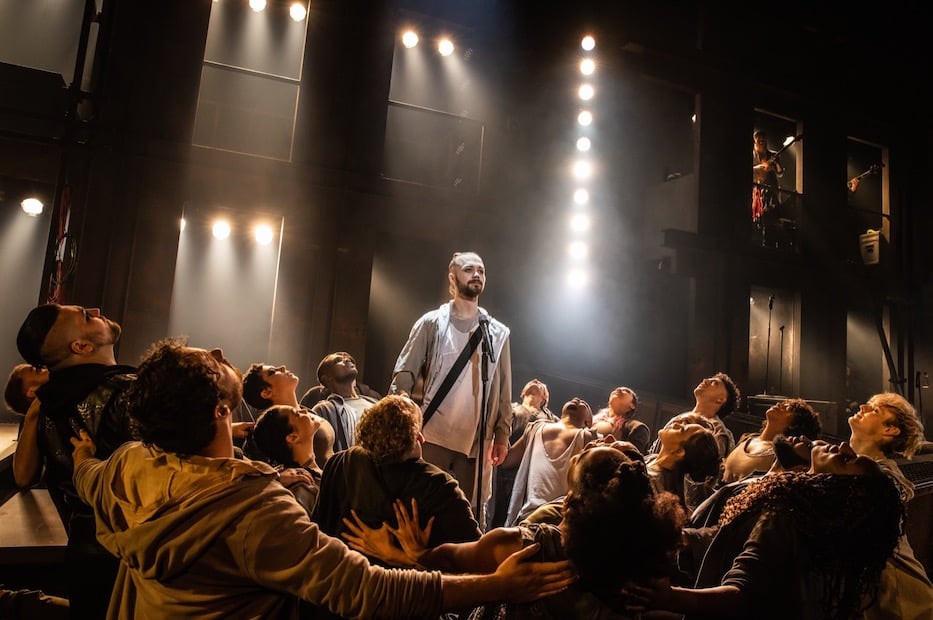
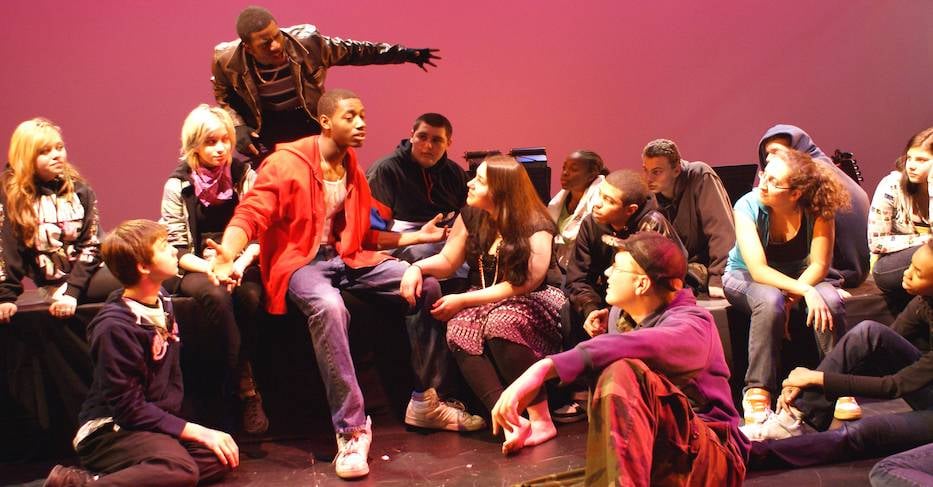
Top: Jack Hopewell and the company of the North American Tour of Jesus Christ Superstar. Photo by Evan Zimmerman for MurphyMade, Courtesy of the Shubert Theatre. Bottom: Henry Green in Jesus Christ Superstar at Cooperative Arts & Humanities High School. Robert Esposito Photo.
A shock of electric guitar undulated over the Shubert Theater, bathing the house in something sharp and voltaic. Lights came up, the low and hazy purples of a bruise. On stage, Emma Cook raised her hands, limbs pliant and electric, her body bouncing up and down a platform. Only after a moment did it reveal itself as a glowing, giant crucifix set on its back.
In the mezzanine, educator Rob Esposito watched as Judas (Elvie Ellis) made his way onto the stage, a blood-curdling cry trapped somewhere between his gut and his throat. Already, Esposito knew who was missing from that stage—and could feel the tears coming.
Sunday evening, that scene came to the Shubert Theatre during the North American tour of Jesus Christ Superstar, which stopped in New Haven Friday through Sunday. For Esposito and a group of Cooperative Arts & Humanities (Co-Op) High School grads seated in the mezzanine, it became a chance to collectively remember Henry Green, a fallen member of their own cast whose Christ-like gentleness, steady spirit and belief in others defined his time here on earth.
Green, a multi-talented actor, son, brother and friend who was known and loved in New Haven as “Renegade,” died on July 22, 2018, eight years after a gunshot wound to the abdomen when he was walking home from work. Almost a decade before that in 2009, he played Jesus on Co-Op’s College Street stage, christening it before he graduated from high school. Less than a year later, he would be in the hospital fighting for his life.
“It was very triggering for me,” Esposito said, his eyes red from crying at the end of the show. “Henry, of all the students I’ve met, of all the people I’ve met, lived the life of Christ. A lot of that came up when you saw the suffering in this play. The story of his life was the story of suffering. Suffering and joy. It’s hard to see it and not have all the grief.”
“That’s Your Brother”
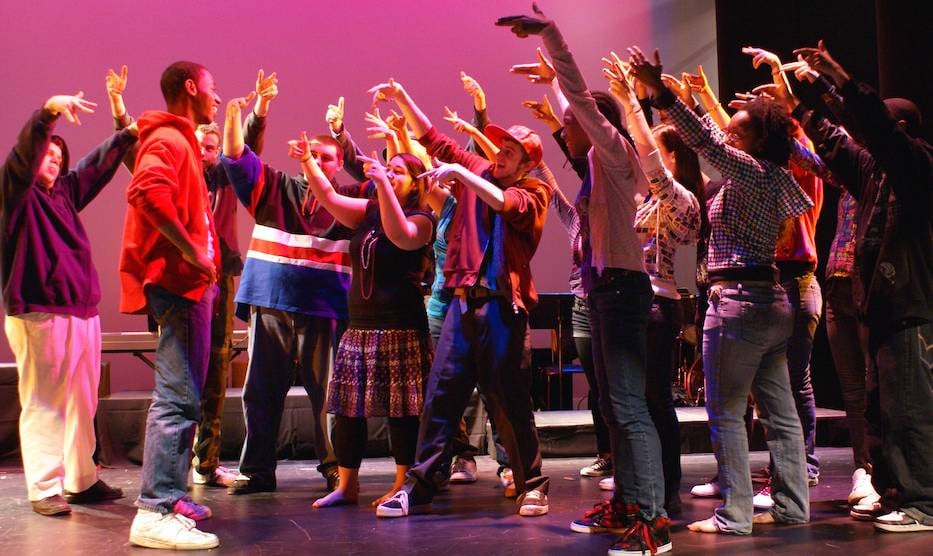
Robert Esposito Photo.
This story doesn’t start in a world where Henry Green is gone. It starts in a world full of magic, where arts master classes, lyrical takes on the Bible, and telling the story of the Son of God before dinnertime are all entirely within reach.
In 2009, Esposito was in his fourth year of teaching at Co-Op, and had already found a star in Green, who was by then a senior. In Co-Op’s previous home, the 444 Orange St. building that is now New Haven Academy, Green had sparkled in performances of Little Shop of Horrors, Urinetown and Footloose. As Co-Op made the move downtown in January 2009, Esposito prepared to stage Jesus Christ Superstar for its sweeping dramatic scope.
“I knew I couldn’t sing it, so I had to direct it,” he said with a soft smile He had known and loved the rock musical, written by Andrew Lloyd Webber in 1971, for decades. “Maybe it was downright crazy to think that I could do it.”
Except, it wasn’t. Co-Op, like Galilee, was and is a land of miracles. And as the play came together, the school watched them multiply over and over again.
The first was a casting miracle. Initially, Esposito thought that Green was destined to play Judas, whose ability to jump between both octaves and emotions makes him a complicated villain. Then Green showed up to auditions with Isaiah Jefferson, a creative writing student who had never been in a musical before. It was a revelation.
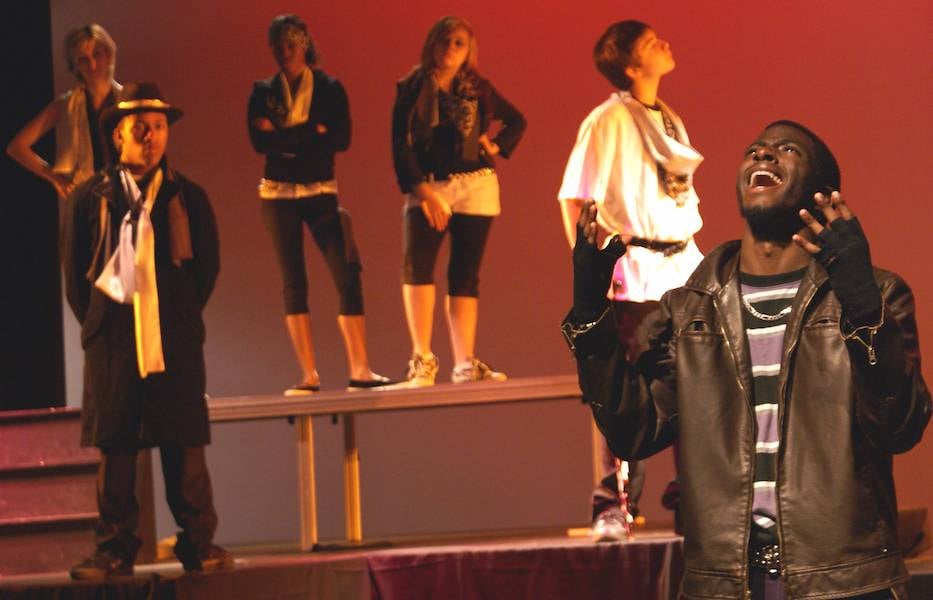
Isaiah Jefferson as Judas. Robert Esposito Photo.
Esposito knew from that point that the play was going to be okay, he remembered Sunday, with high praise for a willing ensemble, tiny pit band and performance from Stephen “Gritz” King as Caiaphas made the work sing. In rehearsals and performances, Jefferson was cool and collected until he was explosive, with a growl in his voice that revealed Judas’ desperation. Across from him, Green was level-headed and steady, beatific and balletic as he crooned in a red hoodie and jeans.
That dynamism came through as students learned the book and mastered staging and choreography, cast members remembered Sunday. On stage, Green was studious, serious as he tried to learn who his character was. But he was also a mentor and a goofball, never too busy to help a fellow actor with their lines, provide wise counsel to his peers, or breathe calm into the chaos of high school theater.
Diamond Antunes, who came into the play as a freshman and who also attended Sunday’s performance at the Shubert, remembered him as a steady and thoughtful guide. She met Green first through her interest in music, which he urged her to pursue. By the time the two were in the play together, “he was like family,” she said. It wasn’t uncommon for Green to invite people over to his home for dinner, where they would meet his sweet and cacophonous siblings.
During the year they overlapped at Co-Op, he urged her to try out rap and spoken word, opening a love for the genre that she still holds tightly to. She later participated in W.O.R.L.D.W.I.D.E., a group that he founded with his younger brother Solomon at the school. It was shorthand for We Only Reach Life’s Dreams When It’s Declared Everywhere.
“We had an amazing leader in our main character,” she said. “He just gave so much guidance. It was a presence you’ll never forget.”
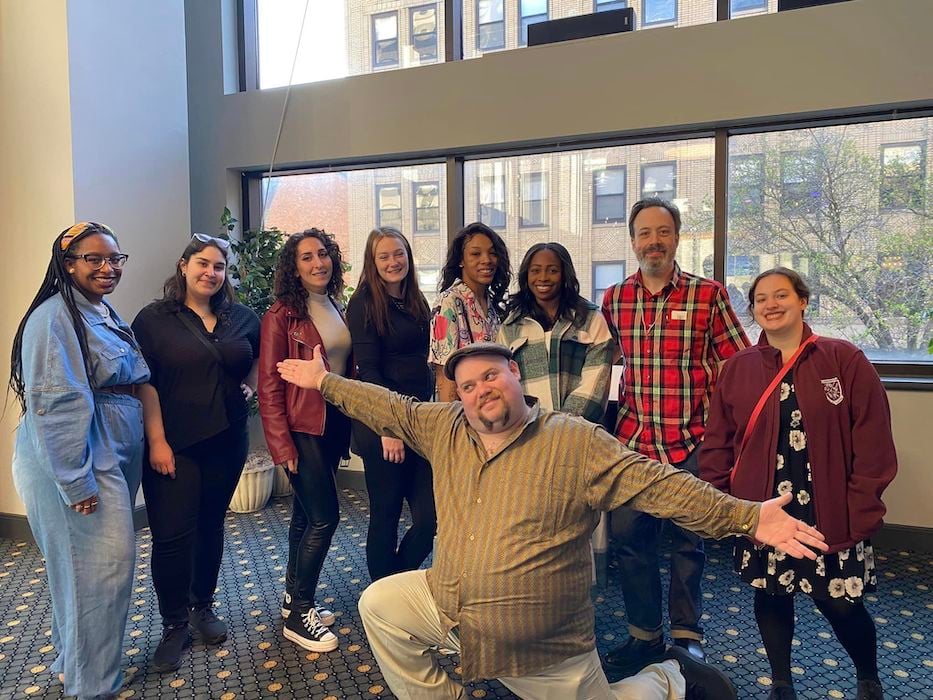
Lyndsay Cromwell, Lexi George, Margaret Viera, Ashley Potter, Diamond Antunes, Briana Dawson, Rob Esposito, Gabriela Esposito (who was eight in 2009, and later graduated from Co-Op), and Noah Roffman (in front). Vandy Esposito Photo.
Sunday, multiple cast members remembered that capacity to care for others. Briana Dawson, then a junior who played a priest, became extra close with Green through Urinetown and Footloose. In 2009, her family was living in a hotel after a pipe burst in their home, flooding the place. Green listened patiently as she spoke about everything she was going through. He checked in on her. He was generous in that way, she remembered.
“He didn’t fear anyone,” she said. “He would stand up for anyone. Anyone. To think that there’s a young man who could do that is mind boggling.”
“He was often the glue that kept us together,” chimed in Noah Roffman, who played King Herod. “He brought something I’ve never seen before.”
It made everything else feel like a small, surmountable hurdle at the school. When rehearsals began in January 2009, Co-Op was in the midst of moving its entire student body into its current building of 177 College St., which sits just one block down from the Shubert Theatre. When students moved in on Barack Obama’s Inauguration Day, parts of the building were still under construction.
“You didn’t know anything because the building was so new,” Antunes said, smiling at the memory of constantly getting lost. Because the auditorium wasn’t yet finished, students started rehearsals in the old building, and then moved into Co-Op’s gymnasium until just days before the show. Props were minimal, the pit was tiny, and their street clothes became their costumes. The set consisted of a few pieces of scaffolding.
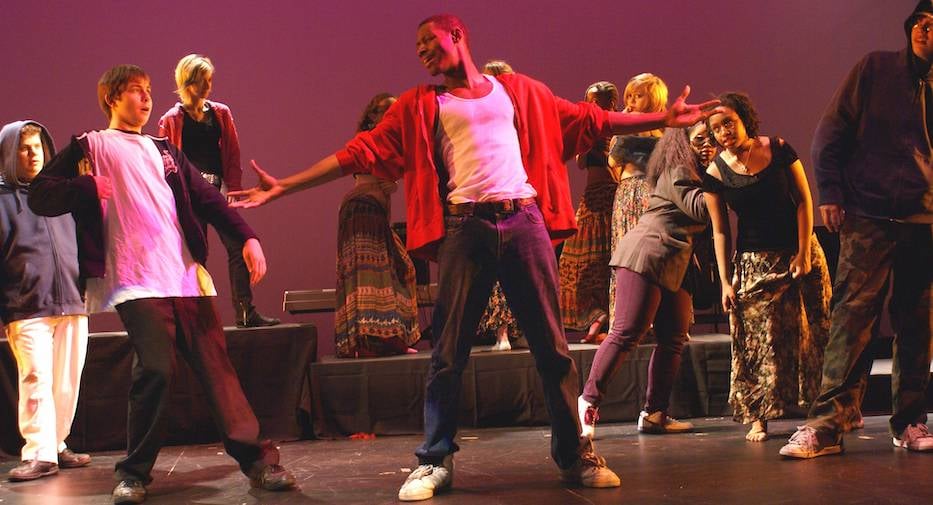
Robert Esposito Photo.
This was Jerusalem, with a New Haven twist. In a video from the show, Green’s vocals are deep and buttery, and he paces himself so carefully, so methodically that even the band slows down to make each word last. As they fill the stage, students become his disciples in jeans and t-shirts, bringing the story right into the present.
By the time they’ve reached “Simon Zealotes,” they are somewhere between a hip-hop cypher and a tent revival, with arms that sail through the air in gorgeous unison. When she comes in as Mary Magdalene, Lexi George finds that sweet spot between gospel and opera, her voice carrying the entire song. Pontius Pilate (David Thomson) appears dressed as a cop, and it doesn’t feel so far from New Haven at all.
And in the midst of it, there was another miracle: a new and budding relationship with the Shubert Theatre, which Co-Op students including Green later fought to keep. Or as Shubert Director of Education and Engagement Kelly Wuzzardo remembered it, “the stars just aligned,” and everything fell into place.
In 2009, the Shubert was also in the midst of staging Jesus Christ Superstar, in a touring fit of panache and pageantry that starred the actor Ted Neely. Shortly before Co-Op’s show opened, Neely and fellow cast members went over to the school to give a workshop and wish the cast good luck. It lasted for hours, with Shubert staff ushering them out of the building before they’d be late to their own curtain call.
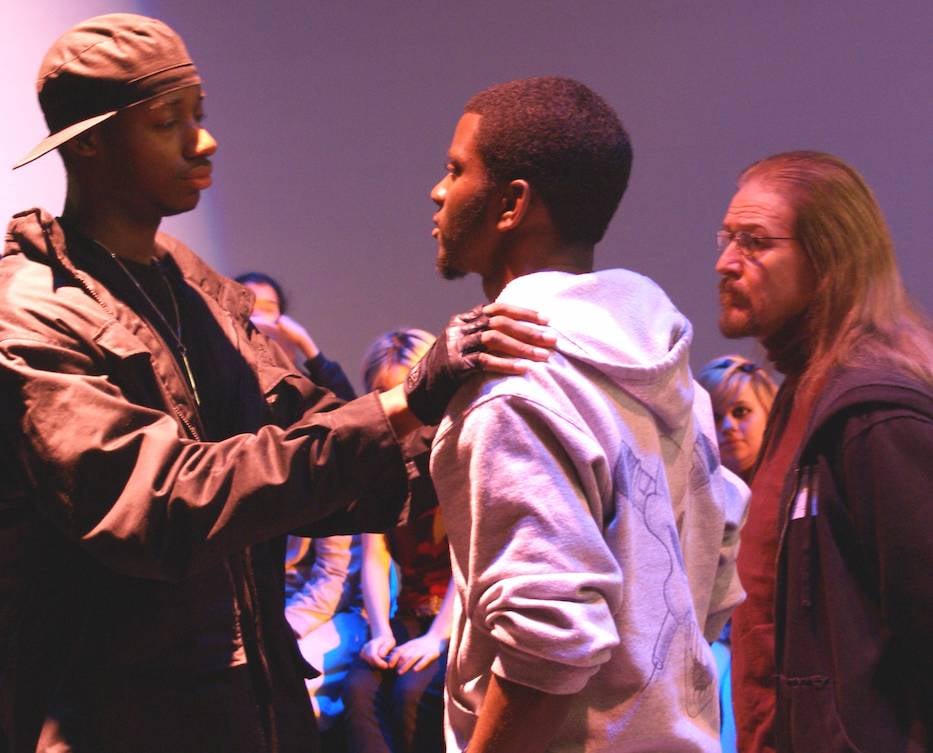
Henry Green, Isaiah Jefferso, and Ted Neely. Robert Esposito Photo.
The visit changed the cast’s understanding of the show. Before Neely left that night, either Green or Jefferson—no one could remember who on Sunday—asked how to navigate the relationship between Jesus and Judas. In the show, Esposito had always intended for them to be equals. It stood in stark contrast to the Shubert’s 2009 performance, in which every moment revolved around Neely.
Neely brought them both in close. “That’s your brother,” he whispered in Green’s ear.
He turned to Jefferson. “That’s your brother,” he whispered a second time. He put a hand on both of their shoulders. Then he repeated himself, so quietly that only the two could hear.
Co-Op grad Lyndsay Cromwell, then a member of the ensemble, said she can still remember the moment. By the end of it, Green and Jefferson were embracing each other. Cast members had started crying. The moment—a brotherhood, interrupted—defined the show, which opened to a full house in Co-Op’s new auditorium just days later. During the run, theater critic Chris Arnott hailed it as “the Jesus Christ Superstar I needed to see.”
“It’s Like We’re Missing A Piece”
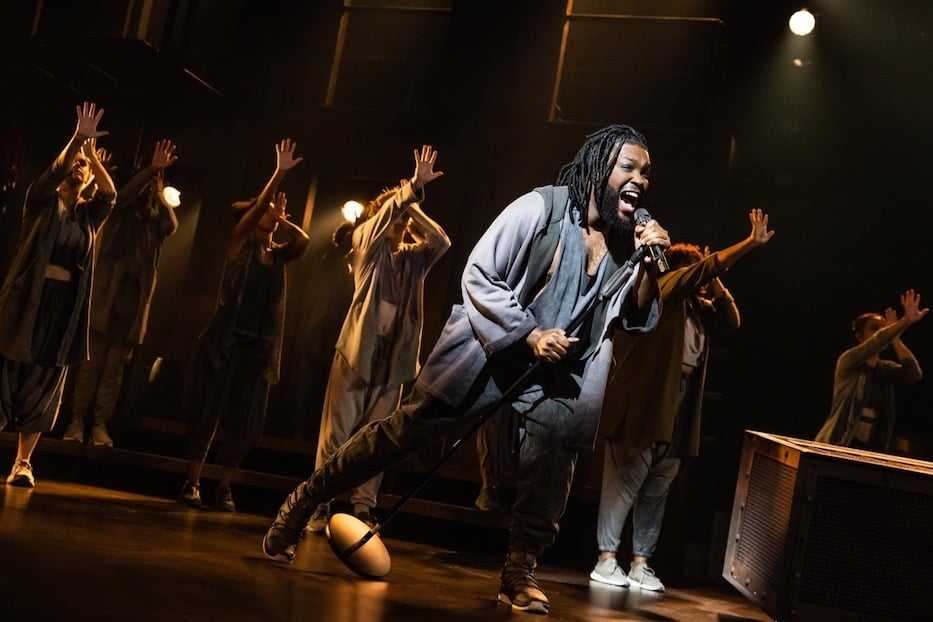
Elvie Ellis and the company of the North American Tour of Jesus Christ Superstar. Photo by Evan Zimmerman for MurphyMade. Courtesy of the Shubert Theatre.
As alumni gathered on the theater’s second floor Sunday, all of them remembered rallying around each other to bring the show to life. Cromwell, who had never done musical theater before, recalled how much of a community Co-Op created around the show. Fourteen years later, many of the cast members are still friends with each other.
“I think it was one of the first plays that I felt like, ‘Oh wow, I’m really a part of something,’” she said. At the center, their Jesus made the whole world feel possible. “I think everyone looked up to him. You always wanted to be in his bubble.”
No wonder, then, that when the lights came down and the first strains of the fuzz-kissed overture floated out over the house, all seven Co-Op grads—and Esposito, there with his wife Vandy and daughter Gabriela—were ready to sing along to each word. At stage right, Music Director Mark Binns struck up the orchestra, and suddenly the set felt alive.
As he swept across it, Ellis commanded every square inch of space, setting the story into motion. At one point, his vocals ripped through the air, and it felt more like a rock concert or metal performance of Hamilton (Aaron Burr, eat your heart out) than a musical about the King of Kings. At another, he dipped his hands into a chest of coins, and the audience took a collective inhale as they came out coated in silver dust.
As they watched from above, the Co-Op group took it all in. Jesus (Jack Hopewell) made his way onto the stage, and alumni began to size up characters that they knew inside and out. In a shirtless Caiaphas (a deliciously evil Grant Hodges, who does not break character for the entire show), they remembered how Gritz began his lines in song, and then broke out into a sax solo to make them entirely his own. As characters flooded the stage in billowy, slate-colored streetwear, they thought back to their own opening night, as they broke in the stage with sweats, jeans and sneakers.
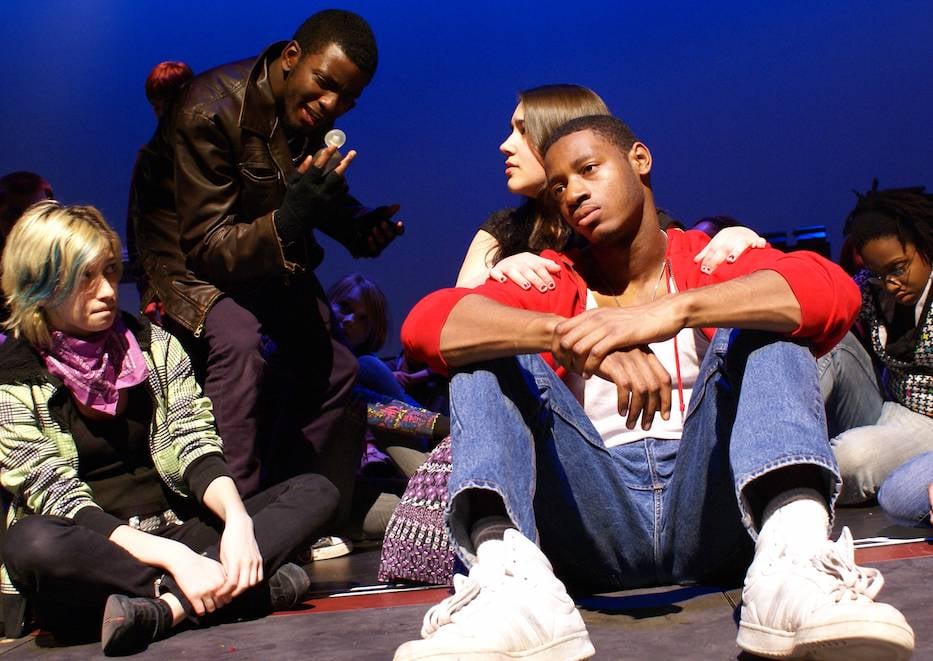
Isaiah Jefferson as Judas, Lexi George as Mary Magdalene, and Henry Green as Jesus Christ. Robert Esposito Photo.
In Faith Jones, George found a deeply soulful Mary Magdalene, with a voice as sweet as the ointment she applies to Christ’s tired, aching body. By the time she sang “I Don’t Know How To Love Him,” her voice a sky-bound songbird, there wasn’t an ear in the audience that wasn’t holding on. Roffman couldn’t take his eyes off Erich W. Schleck, whose King Herod felt more like Hedwig as he high-kicked in thick white makeup and full royal drag.
“The show has aged well and always will, but what is interesting to me is how the show has changed,” he said after the performance. In its 50th anniversary update, the band is fully exposed, the choreography is propulsive and unbound, and pain, deception and evil all come in the form of gold glitter, sometimes poured from one vessel into another in a glittering stream (Wuzzardo later said that the technical direction was “an unreasonable amount” of glitter”).
They also remembered who wasn’t there. When the cast exploded into euphoric, otherworldly choreography, it seemed like Green should have been watching in the mezzanine, eyes flickering with movement as the action unfolded onstage. George, who played Mary Magdalene, could see him in the Garden of Gethsemane, where Judas exposes Christ to the Pharisees with a single kiss.
She noted how much more Green relied on nuance to tell the story, his face a whole universe when he looked out at the audience, or in at the cast. Where Hopewell mewled and fretted into a mic, it was clear Green was crying with no sound at all.
“It feels weird, being here without him,” George said after the show. “It’s like we’re missing a piece.”
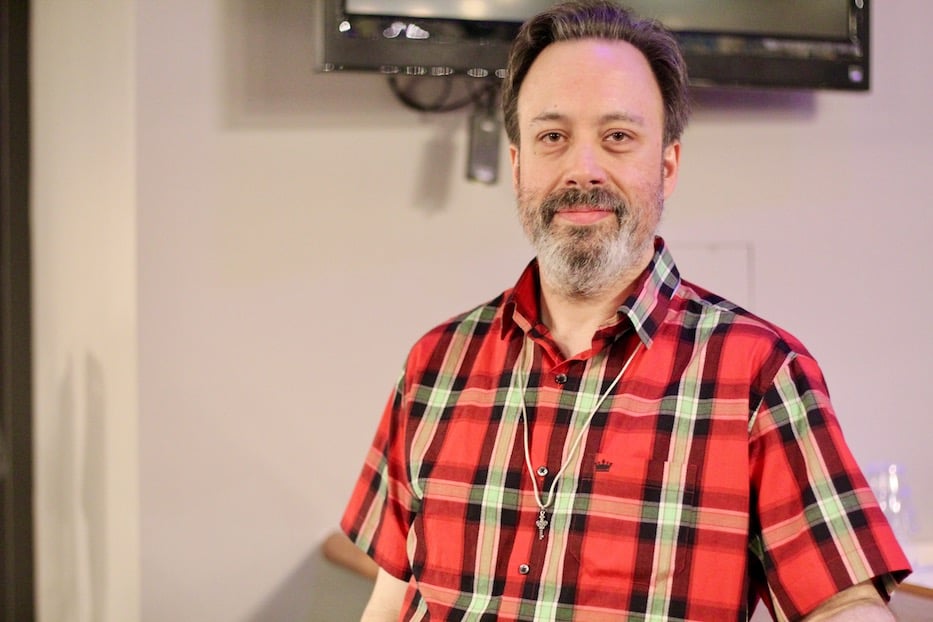
Lucy Gellman Photo.
That was also true for Esposito. As he watched, his thoughts flitted to a necklace that he always wears to the theater, with a key-shaped pendant topped with a crown and a cross. The crown is a symbol of heaven; the cross, the suffering of life. Before he died, Green had it tattooed on his arm. In 2018, Green’s mother, Linda Marks, gifted it to the people who had loved her son, and who he had loved back, after his funeral.
When Hopewell and Ellis ended the show on different sides of the cross, staring into each other's eyes, Esposito’s mind went to another image that is still clear as day. At Co-Op, the play ended in a freeze-frame of a pietà, with George holding Green in her arms. In some universe, it was still 2009, and time could stop and start. Then the lights came up, and the spell was broken.
Back upstairs, Esposito and alumni agreed that there was a gap they couldn’t fill, no matter how strong a given production was. When Co-Op’s final performance ended in 2009, George couldn’t stop crying, even after the curtain fell and the show was officially over. “I think you guys internalized it [that the show was over],” said Margaret Viera, who was in the ensemble at the time.
Over a decade later, it is helping her and fellow cast members mourn and remember in a different way. Before alumni exited the theater back onto College Street, many embraced, vowing to stay in touch.
“I’ve had my own kind of grief journey, and I think this show allows grief to show up for us as artists,” Cromwell said before heading out. “Like, just have the cry! Have the cry!”

